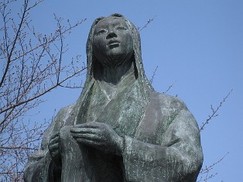 Princess No
Princess No The marriages that we have examined up until now, such as that between O-ne and Hideyoshi, could be categorised as marriages of love. Yet in the Sengoku period, as in periods before that time, marriages based on love were exceedingly rare. Parents would choose whom their offspring would marry, and the marriage would not be between individuals on the basis of love, but formed the basis of binding two households together. The most typical of such practices were strategic marriages. From a modern perspective, such marriages are regarded simply as tragedies, yet for the people of previous ages, these kinds of marriages, whereby one`s parents chose one`s partner, were a matter of course. For the people concerned, they certainly did not regard themselves as victims.(223)
It was Nagai Michiko who pointed this particular phenomenon out at a relatively early stage. Her book `A unique portrait of women of the Sengoku era` (published by Rekishi to Tabi in 1992) said the following with regard to this point.
“Women were not the tools of men. Women from households of the daimyō class were joint administrators of that household. If a male was, for example, the prime minister, his sisters would be the deputy prime minister, and one of those deputies would serve as a diplomat. Her service to her country would be in the form of marriage. In other words, she was a female ambassador who also engaged in sex. It might seem somewhat crude to describe a woman in such terms, yet this was part of that reality. In truth, because women were married off, it meant that provinces that had been fighting up until then would cease fighting each other and was a prime example whereby peace could be maintained.(224)
In order to prove proof of that peace, the sisters of the head of the household would be married off to other provinces. Oda Nobuhide of Owari province and Saitō Dōsan of Mino province had what could be described as a `love/hate` relationship. No matter how many times they fought, neither came out as victor. It was around this time that Oda Nobuhide decided that he wanted to make an alliance both with Dōsan and with Imagawa Yoshimoto, lord of Tōtōmi and Suruga provinces, and who was looking to expand into Mikawa province. Deciding that it would not be a good idea to have enemies on both sides of his province`s borders, Nobuhide took the advice of his retainer Hirate Masahide and made an alliance with Dōsan. To cement this, Dōsan`s daughter Princess Nō was sent as a bride to Nobuhide`s son and heir Nobunaga, and was a stereotypical political marriage.(224)
As a result of this marriage, the conflict that until then had been waging between Owari and Mino ceased. This is why the example using women as a means to avoid war is so easily understood. Those `female ambassadors who also engaged in sex` performed their role admirably.(226) Yet a strategic marriage is a strategic marriage, and certainly different to a standard marriage. When the characters for `strategy` are added to marriage, that implies use as a strategic tool, used for strategic purposes. As a result of a change in circumstances from peaceful times, there were many examples of such marriages ending in tragedy.(226)”
 RSS Feed
RSS Feed